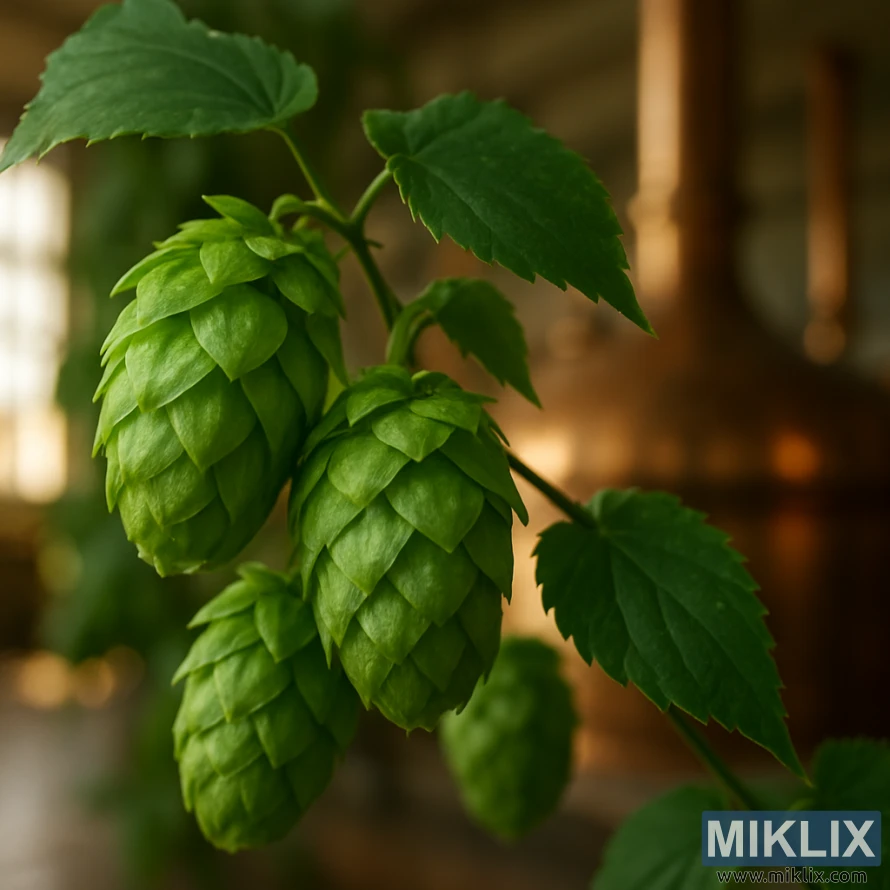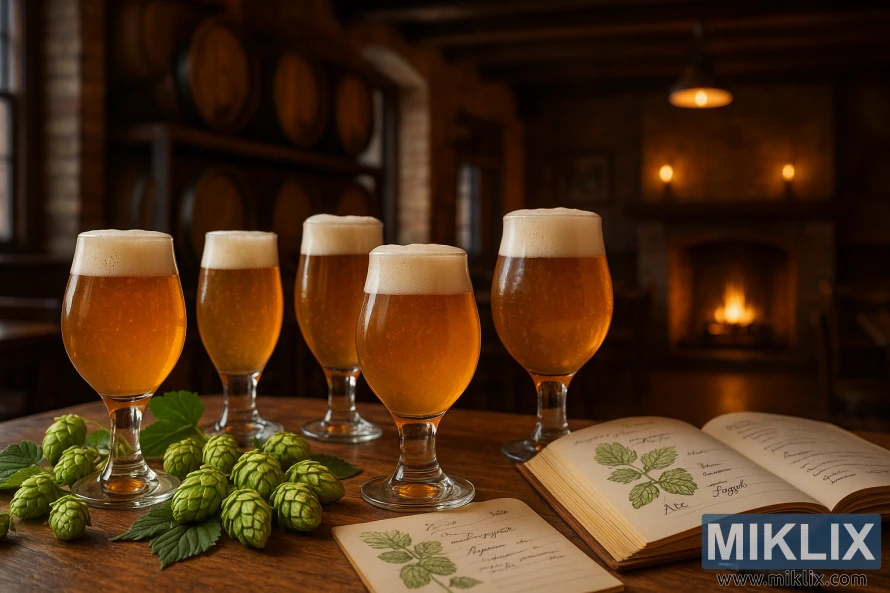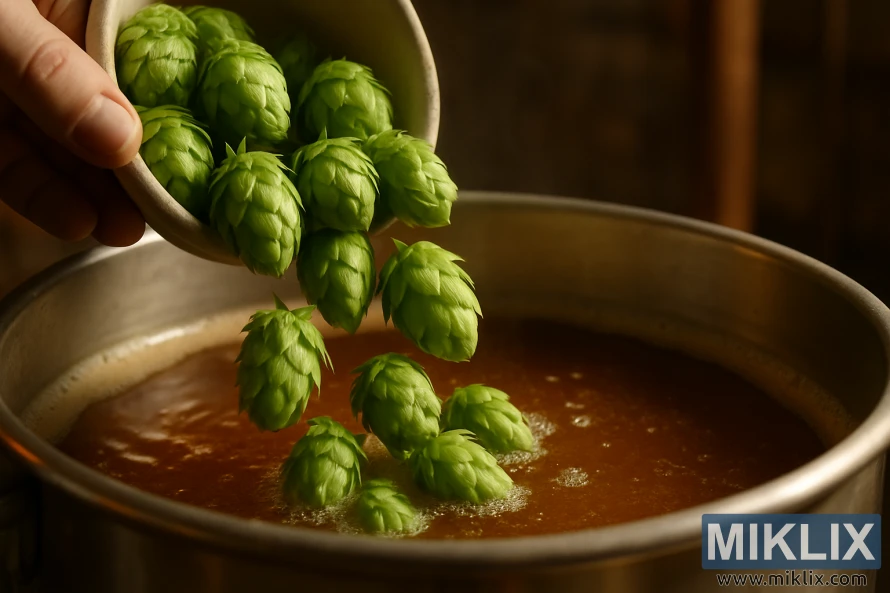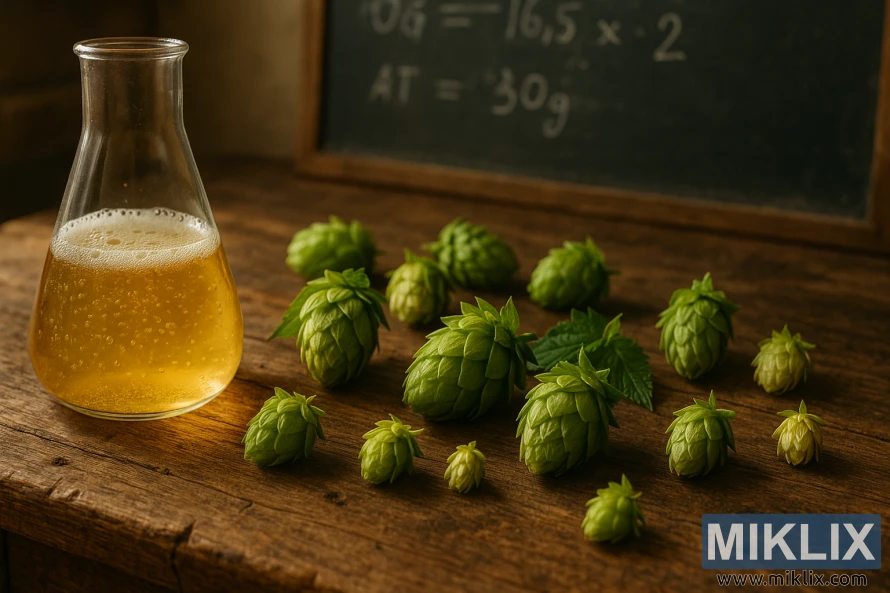Hops in Beer Brewing: Fuggle
Published: September 10, 2025 at 9:34:22 PM UTC
Beer brewing is an art that heavily relies on the quality and characteristics of its ingredients. Hops, in particular, play a vital role in defining the flavor, aroma, and overall character of beer. Fuggle hops, with a history dating back to the 1860s in Kent, England, have been a staple in brewing for over 150 years. These hops are renowned for their mild, earthy flavor and aroma. This makes them a versatile choice for various beer styles. Understanding the role of Fuggle hops in beer brewing is essential for creating unique and delicious beers.

Key Takeaways
- Fuggle hops have a rich history in beer brewing, dating back to the 1860s.
- They are known for their mild, earthy flavor and aroma.
- Fuggle hops are versatile and can be used in various beer styles.
- Understanding Fuggle hops is essential for creating unique beers.
- Fuggle hops contribute to the complexity and character of beer.
The Rich History of Fuggle Hops
Fuggle hops trace their origins back to the 1860s, embedding themselves deeply in England's brewing traditions. Initially cultivated in Kent, England, they quickly rose to fame for their distinct traits and brewing versatility.
The emergence of Fuggle hops was a turning point in beer brewing history. As a traditional hop variety, they've enriched a variety of beer styles. This has contributed to the unique flavors and aromas found in English ales.
Fuggle hops have been instrumental in shaping the brewing industry. They've become a cornerstone ingredient in many breweries. Their lasting appeal reflects the profound history and cultural importance of this hop variety.
- Fuggle hops were first cultivated in the 1860s in Kent, England.
- They have been used in various beer styles, including English ales.
- Fuggle hops are known for their unique characteristics and versatility.
The influence of Fuggle hops continues to shape modern brewing. Many brewers value their role in beer's flavor and aroma.
Essential Characteristics of Fuggle Hops
Fuggle hops have been a cornerstone in beer brewing for their distinct flavor and aroma. These traditional English hops are celebrated for their mild, earthy taste and subtle scent. This makes them a versatile choice for a variety of beer styles.
Fuggle hops stand out due to their balanced alpha acid content, usually between 4-5%. This moderate bitterness is perfect for a broad range of brewing tasks. It suits everything from bittering to adding flavor and aroma.
The flavor of Fuggle hops is often noted as woody, earthy, and slightly spicy, with floral undertones. Their aroma is a delicate mix of earthy and floral notes. This adds depth and complexity to beer without dominating it.
In brewing, Fuggle hops are prized for their ability to enrich beer with a nuanced character. They are a top pick for traditional English beer styles, like pale ales and bitters. Here, their subtle flavor and aroma can truly come to the forefront.
- Fuggle hops offer a balanced alpha acid content ideal for various brewing applications.
- Their earthy, woody flavor profile adds depth to beer.
- Fuggle hops are a traditional choice for English beer styles.
In summary, Fuggle hops are a favorite among brewers for their unique flavor and aroma. Their versatility ensures they remain a staple in craft brewing.
Growing Regions and Cultivation Requirements
Regions with the right climate and soil are perfect for growing Fuggle hops, a key ingredient in beer. For centuries, Fuggle hops have been cultivated mainly in the United Kingdom. The climate and soil there are ideal.
To grow Fuggle hops, one must understand the climate and soil needs. These hops do well in temperate climates with moderate temperatures. They also need well-drained soil rich in nutrients, with a pH between 6.0 and 7.0.
In the United States, Fuggle hops are grown in areas like the Pacific Northwest. This region's climate is similar to the UK's. The Yakima Valley in Washington and the Willamette Valley in Oregon are notable for hop cultivation, including Fuggle hops.
- Key factors for Fuggle hop cultivation include:
- Cool and moist winters
- Warm and dry summers
- Well-drained soil with adequate nutrients
- Support structures for climbing
Growing Fuggle hops comes with challenges and opportunities. Growers face issues like disease and pests, and the need for precise climate and soil conditions. Yet, the high demand for quality hops like Fuggle drives innovation in cultivation. This offers growers chances to enhance yields and quality.
In conclusion, growing Fuggle hops successfully requires the right climate, soil, and cultivation practices. As craft beer demand grows, understanding these requirements is vital for brewers and hop farmers.
Chemical Composition and Brewing Properties
The alpha and beta acid content of Fuggle hops are key factors in their brewing properties. Known for their balanced chemical composition, Fuggle hops are a versatile choice for brewers.
Fuggle hops typically have an alpha acid content ranging from 4% to 6%. The beta acid content usually falls between 2% and 3%. This balance contributes to the hop's mild bitterness and aroma.
In brewing, the chemical composition of Fuggle hops impacts the beer's overall character. The alpha acids contribute to bitterness, while beta acids and essential oils influence aroma and flavor.
Fuggle hops' brewing properties make them suitable for various beer styles. Their mild bitterness and earthy, woody notes complement a range of malt profiles. This allows brewers to create complex and balanced beers.
- Fuggle hops' alpha acid content provides a smooth bitterness.
- Their beta acid content contributes to a subtle aroma.
- The hop's essential oils enhance the beer's flavor profile.
Understanding the chemical composition and brewing properties of Fuggle hops helps brewers optimize their use in various beer recipes. This knowledge enables brewers to harness the full benefit of Fuggle hops. It helps them create high-quality beers with distinct characteristics.
Aroma and Flavor Profile
Fuggle hops are celebrated for their distinct aroma and flavor, greatly impacting beer character. Their aroma is often noted as earthy, woody, and slightly floral, with a hint of spice. This unique mix makes Fuggle hops a go-to for brewers looking to add depth to their brews.
The flavor of Fuggle hops mirrors their aroma, bringing earthy and woody notes to beer. These subtle spice and floral hints add complexity, making Fuggle hops a top choice for traditional English-style ales.
Some key aspects of Fuggle hops' aroma and flavor profile include:
- Earthy undertones that contribute to a rich, complex flavor
- Woody notes that add a traditional character to the beer
- Floral hints that enhance the beer's aroma
- A subtle spice character that rounds out the flavor profile
The blend of these traits makes Fuggle hops ideal for specific beer styles. By grasping the aroma and flavor profile of Fuggle hops, brewers can craft distinctive and appealing beers.
Best Beer Styles for Fuggle Hops
Fuggle hops, a traditional English variety, are known for their versatility in brewing. Their balanced alpha acid content and unique flavor make them a favorite among brewers. This hop variety is a key ingredient in many beer styles.
They are a perfect match for traditional English ales, such as Pale Ales and Bitters. Fuggle hops introduce a subtle earthy and woody note. This complements the malt, creating a balanced taste.
Fuggle hops also shine in Porters and Stouts. Their mild bitterness and complex flavor enhance these darker beers' richness.
Craft brewers often experiment with Fuggle hops. They combine them with other varieties to craft unique flavors. Fuggle can be used as a bittering hop, a flavor hop, or for dry-hopping. This adds a subtle aroma to the beer.
- Pale Ales: Fuggle adds a traditional English character.
- Bitters: Provides a balanced bitterness and flavor.
- Porters and Stouts: Enhances complexity with earthy notes.
Fuggle hops' adaptability makes them essential in a brewer's arsenal. They allow for the creation of a wide variety of beers. This caters to different tastes and preferences.

Proper Storage and Handling
To keep Fuggle hops in top shape, it's vital to know the best storage and handling methods. These practices are key to preserving the quality and aroma of Fuggle hops.
For storing Fuggle hops, brewers should place them in a cool, dry spot. This area should be away from sunlight and heat. The best storage involves keeping a consistent refrigerated temperature below 40°F (4°C). This ensures the hops' alpha acids and essential oils stay intact.
When handling Fuggle hops, care is essential to avoid damage and air exposure. Here are some tips for handling Fuggle hops:
- Minimize exposure to air by storing hops in airtight containers or vacuum-sealed bags.
- Handle hop packages gently to avoid damaging the contents.
- Keep the storage area clean and free from contaminants.
By adhering to these guidelines, brewers can keep their Fuggle hops in the best condition. This ensures they are ready for brewing high-quality beers. Proper storage and handling of Fuggle hops not only preserve their quality but also enhance the brewing process's success.
Brewing Techniques with Fuggle Hops
Fuggle hops are renowned for their distinct characteristics and versatility in brewing. They offer a mild, earthy flavor and aroma, making them a favorite for many beer styles. This versatility allows brewers to explore different techniques to enhance the desired flavors and aromas.
Understanding how Fuggle hops interact with other brewing ingredients is key. This knowledge helps brewers optimize their use in the brewing process. The timing of hop additions is a critical aspect to consider.
Fuggle hops can be added at various stages, including bittering, flavor, and aroma. The bittering addition is typically made at the start of the boil. Later additions are for flavor and aroma. This approach ensures the hops' unique qualities are fully utilized.
- Fuggle hops are perfect for traditional English beer styles, such as bitters and pale ales.
- They add depth and complexity to darker beers like porters and stouts.
- Their mild flavor is ideal for session beers with subtle hop characteristics.
By mastering brewing techniques with Fuggle hops, brewers can craft a wide range of beer styles. These beers showcase the unique qualities of Fuggle hops, delighting beer enthusiasts.
Optimal Addition Timing in the Brewing Process
Timing is everything when it comes to adding Fuggle hops. The right moment can greatly enhance the beer's quality. The timing of hop addition is key, shaping the beer's flavor, aroma, and overall character.
Fuggle hops are versatile, fitting into various stages of brewing. The best time depends on the brewer's goals. For bitterness, they're added early in the boil. For flavor and aroma, they're added later or during dry-hopping.
Here are some general guidelines for adding Fuggle hops at different times:
- Early boil: Adds bitterness
- Mid-boil: Contributes to flavor
- Late boil: Enhances aroma
- Dry-hopping: Intensifies aroma
The exact timing varies based on the brewer's aims and the beer style. Trying different times can help achieve the perfect balance of flavors and aromas.
Understanding the best time for Fuggle hops can lead to exceptional beers. Brewers can unlock the full flavor and aroma of their creations.

Commercial Applications and Success Stories
Fuggle hops are a favorite among commercial brewers for their distinct aroma and flavor. Their versatility and the depth they add to various beer styles have made them a staple in the industry.
Fuggle hops are known for their balanced alpha and beta acid content. This balance makes them ideal for both bittering and flavor/aroma additions in brewing. It contributes to the complex flavor profiles found in many commercial beers.
Commercial breweries have successfully used Fuggle hops in a variety of beer styles. From traditional English ales to modern craft beers, Fuggle hops allow brewers to create distinct flavor profiles. These appeal to a wide range of consumers.
- Fuggle hops are often used in pale ales and bitters for their subtle earthy and floral notes.
- They are also used in porters and stouts to add depth and complexity to the darker beer styles.
- Their balanced alpha acid content makes them suitable for bittering additions, while their aroma characteristics are valued in flavor/aroma additions.
The success stories surrounding Fuggle hops in commercial brewing are numerous. Many breweries have achieved acclaim for their beers that feature Fuggle hops as a primary ingredient. The enduring popularity of Fuggle hops is a testament to their quality and the value they bring to the brewing process.
In conclusion, Fuggle hops remain a vital component in commercial beer brewing. They offer brewers a versatile ingredient for creating a wide range of beer styles. Their unique characteristics and the success stories associated with their use underscore their importance in the industry.
Comparing Fuggle Hops to Other Varieties
In the world of beer brewing, Fuggle hops stand out when compared to other varieties. They are a key component in traditional British ales and bitters. This is due to their balanced alpha acid content and distinct earthy flavor.
Several factors influence the comparison of Fuggle hops to others. These include alpha acid content, flavor profile, and aroma. Fuggle hops have a moderate alpha acid content, ranging from 4-6%. This is lower than high-alpha varieties like Cascade or Chinook but suitable for balanced bitterness in certain beer styles.
- Fuggle hops are known for their earthy and woody flavors, contrasting with the citrus and floral notes of varieties like Saaz or Hallertau.
- The aroma profile of Fuggle hops is mild and pleasant, making them ideal for brewers seeking subtle hop character.
- In terms of brewing properties, Fuggle hops are versatile, suitable for bittering, flavor, and aroma additions, though their lower alpha acid content makes them less ideal for high bitterness applications.
Brewing with Fuggle hops offers a unique experience. They are favored in traditional British beer styles, such as English Pale Ale and Bitter. Their earthy and slightly sweet characteristics complement the malt profile.
Comparing Fuggle hops to other popular varieties:
- Fuggle vs. East Kent Goldings: Both are traditional English hops, but East Kent Goldings have a more refined and delicate character, while Fuggle is robust and earthy.
- Fuggle vs. Cascade: Cascade is known for its high alpha acid content and citrus flavor, making it a popular choice for American-style ales, in contrast to Fuggle's more subdued profile.
In conclusion, Fuggle hops have a distinct place in beer brewing. They offer brewers unique characteristics that set them apart from other hop varieties. Understanding these differences is key for selecting the right hops for specific beer styles and achieving the desired flavor and aroma profiles.
Common Brewing Challenges and Solutions
Understanding the common challenges and solutions when brewing with Fuggle hops is key. Fuggle hops are a traditional favorite in beer brewing, known for their mild flavor and aroma. Yet, brewers often face specific hurdles when working with this hop variety.
One major challenge is Fuggle hops' susceptibility to diseases and pests. This can cause inconsistent crop yields and quality. To tackle this, adopting integrated pest management practices is essential. This ensures healthier crops and more reliable supplies for brewers.
Another challenge is Fuggle hops' relatively low alpha acid content. This affects the beer's bitterness and balance. Brewers can address this by adjusting the hopping schedule or blending Fuggle hops with other varieties that have higher alpha acid content.
Proper storage and handling of Fuggle hops also pose challenges. Improper storage can result in a loss of aroma and flavor, impacting the final product. Brewers should store Fuggle hops in a cool, dry environment. They should also use them within a reasonable timeframe to maximize their flavor and aroma.
Brewers may also face challenges related to the brewing process itself, such as achieving the right flavor balance. To overcome this, brewers can experiment with different brewing techniques and recipes. This highlights the unique characteristics of Fuggle hops.
- Implement integrated pest management to improve crop yields and quality.
- Adjust hopping schedules or blend Fuggle hops with other varieties to achieve desired bitterness levels.
- Store Fuggle hops properly to preserve their aroma and flavor.
- Experiment with brewing techniques to find the optimal balance for Fuggle hops.
By understanding these common brewing challenges and implementing effective solutions, brewers can unlock the full flavor of Fuggle hops. This allows them to create high-quality beers that showcase the unique characteristics of Fuggle hops.

Pairing Fuggle Hops with Other Hop Varieties
Fuggle hops, when combined with other hop varieties, offer brewers a versatile palette for crafting unique beers. The mild, earthy flavor profile of Fuggle hops makes them an excellent complement to a variety of other hop types.
When pairing Fuggle hops with other varieties, brewers can achieve a balance of flavors and aromas that enhance the overall character of the beer. For instance, combining Fuggle with high-alpha-acid hops like Chinook or Cascade can add depth and complexity to the beer's bitterness and flavor.
- East Kent Goldings: Known for their spicy and floral characteristics, East Kent Goldings complement the earthy notes of Fuggle hops.
- Willamette: With their balanced alpha acids and mild flavor profile, Willamette hops blend seamlessly with Fuggle, creating a smooth, rounded character in beers.
- Saaz: The noble Saaz hops, with their crisp, spicy flavor, can add a refined dimension to beers brewed with Fuggle hops.
By experimenting with different combinations of Fuggle and other hop varieties, brewers can develop unique beer styles that stand out in the market. The key is to understand the characteristics of each hop variety and how they interact with Fuggle hops to produce the desired flavor and aroma profiles.
Sustainability and Future of Fuggle Production
The future of Fuggle hops in beer brewing is deeply tied to sustainable production. As the industry expands, the environmental impact of hop cultivation is under scrutiny. Fuggle hops, a staple in British ale brewing, face challenges from disease and climate change. These factors can impact their yield and quality.
Sustainable Fuggle hop production requires practices that reduce environmental impact while remaining economically viable. This includes integrated pest management (IPM), efficient water use, and soil conservation. By adopting these methods, farmers can decrease their use of chemical pesticides and fertilizers. This protects biodiversity and enhances the sustainability of their operations.
Disease management is a significant challenge in Fuggle hop production. These hops are vulnerable to diseases like powdery mildew and downy mildew. Sustainable disease management involves using resistant cultivars, crop rotation, and biological control. These strategies reduce environmental impact and preserve hop quality.
Climate change also poses a major threat to Fuggle hop production. Rising temperatures and changing precipitation patterns can affect yield and quality. Hop farmers are exploring new techniques, such as drought-tolerant varieties and advanced irrigation systems, to mitigate these effects.
The beer brewing industry is key in promoting sustainable Fuggle hop production. By sourcing hops from sustainable farms, breweries support environmental and economic sustainability. Some breweries directly engage with hop farmers to promote sustainable practices and ensure a stable supply of quality Fuggle hops.
- Promoting sustainable agricultural practices among hop farmers.
- Supporting research and development of disease-resistant hop varieties.
- Encouraging the use of renewable energy sources in hop cultivation and processing.
In conclusion, the sustainability of Fuggle hop production is vital for its future in beer brewing. Sustainable practices ensure a continued supply of high-quality Fuggle hops while reducing environmental impact.
Recipe Development and Experimentation
Fuggle hops are a versatile ingredient for brewers aiming to innovate their recipes. With a rich history and unique characteristics, they have been a staple in beer brewing for centuries. This makes them a solid foundation for experimentation and innovation.
One of the key benefits of using Fuggle hops in recipe development is their ability to add depth and complexity to a beer. Their mild, earthy flavor profile is perfect for brewers aiming to create traditional English-style ales, such as pale ales and bitters.
When experimenting with Fuggle hops, brewers can consider combining them with other hop varieties to create unique flavor profiles. For instance, pairing Fuggle hops with more aromatic hops like Cascade or Chinook can add a fascinating contrast to the beer's flavor profile.
Some possible recipe ideas to consider when working with Fuggle hops include:
- Creating a traditional English pale ale using Fuggle hops as the primary bittering hop.
- Experimenting with Fuggle hops in a dry-hopped beer to add a subtle earthy flavor.
- Combining Fuggle hops with other heritage hop varieties, such as Goldings or Bramling Cross, to create a complex and nuanced beer.
The impact of Fuggle hops on the overall character of a beer should not be underestimated. By incorporating Fuggle hops into their recipes, brewers can add a level of sophistication and complexity. This will appeal to even the most discerning beer enthusiasts.
As brewers continue to experiment with Fuggle hops, they will discover new and innovative ways to incorporate this versatile hop variety into their recipes. Whether you're a seasoned brewer or just starting out, Fuggle hops offer a wealth of possibilities for creating unique and delicious beers.
Conclusion
Fuggle hops have been a cornerstone in beer brewing for centuries. They offer a unique blend of flavor, aroma, and bitterness. This enhances various beer styles, making them a valuable ingredient for brewers.
Their rich history and essential characteristics highlight their importance. Growing requirements also underscore their value. This makes them a cornerstone in the brewing world.
Fuggle hops are versatile, used in different beer styles. From traditional ales to modern craft beers, they shine. Their mild flavor and aroma profile make them perfect for balanced and complex beers.
In conclusion, Fuggle hops remain essential in beer brewing. They provide a timeless quality that inspires brewers. By understanding their characteristics and applications, brewers can create unique and captivating brews. This showcases the best of beer brewing.
Further Reading
If you enjoyed this post, you may also like these suggestions:
- Hops in Beer Brewing: Yakima Gold
- Hops in Beer Brewing: Newport
- Hops in Beer Brewing: Pride of Ringwood
